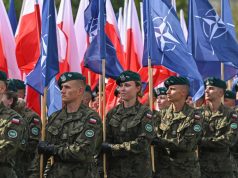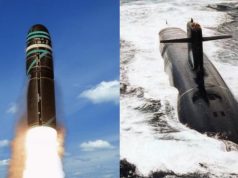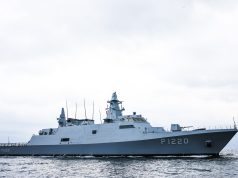The Future of US Bases in Europe: General H.R. McMaster
A large-scale withdrawal from the US base network in Europe “could be devastating, both for our ability to deter conflict and to respond to crises,” said Lt. Gen (Ret.) H.R. McMaster, CEPA reports.
By Mila Tanghe
“It’s really important for us to recognize that this Axis of Aggressors poses a threat to the free world, and we should act accordingly,” said McMaster, who was President Trump’s National Security Advisor 2017-2018, when asked what policymakers underestimate when it comes to Europe.
In a Q&A with the Center for European Policy Analysis (CEPA), McMaster underlined the importance of forward US basing in Europe, warned that scaling back would embolden authoritarian rivals, and argued that deterring future conflict requires a forward presence, not false choices between theaters.
CEPA: How would you assess the operational impact of losing access to key air and naval hubs like Poznan, Ramstein, Lakenheath, or Rota in terms of US power projection?
McMaster: It could be devastating, both for our ability to deter conflict and to respond to crises. In 2017, when some members of the Trump administration were making an argument for retrenchment and disengagement from Europe, I brought President Trump an analysis of our immediate military response after the mass murder attacks of 9/11.
In it, I showed him the contrast between how rapidly we were able to respond and begin active operations against the forces of the Taliban and the Taliban government just a month later, and how long it would have taken if we didn’t have those bases to project power.
It’s important to remember that it’s not only the bases, but it’s also the equipment that you can position forward, and it’s the overflight rights that allow you to project power quickly.
CEPA: How do forward deployments on NATO’s Eastern flank contribute to broader US security objectives?
McMaster: I think we all should know by this point that Vladimir Putin will take whatever he can get. What he’s engaged in is what the historians Jakub Grygiel and Wess Mitchell called in their fantastic book Unquiet Frontier a strategic behavior called probing. Probing at the far reaches of American power, and wherever they assess that there’s an opportunity, they’ll exploit that opportunity.
We’ve seen that time and time again. Certainly, we’ve seen it from the use of Russian new generation warfare and efforts to accomplish their objectives, through political subversion, and other actions that fall below the threshold of what might elicit a concerted military response, such as the 2007 attacks on Estonia.
But also, we’ve seen it happen physically, with the invasion of Georgia in 2008, the first invasion of Ukraine in 2014, and the illegal annexation of Crimea. We’ve seen it in the Black Sea. When we pulled our ships out of the Black Sea, Russia tried to transform it into a Russian lake. It’s important to contest Russia on what the geo-strategists of the late 19th century Mackinder and Spykman called the Rimland.
CEPA: How might Russia and China interpret a significant US troop withdrawal or base closure in Europe?
McMaster: They would interpret it, I think, in the same way they saw other US actions that, in their eyes, portrayed weakness. It’s really important to remember that the first invasion of Ukraine came directly after the unenforced red line in Syria [in 2013], when President Obama chose not to respond militarily to the use of the most heinous weapons on Earth: sarin gas, and other chemical weapons to commit mass murder against civilians.
I think it’s also important to remember that the second massive reinvasion of Ukraine in February of 2022 followed the humiliating self-defeat and deadly withdrawal from Kabul in August 2021.
I think the real lesson is that weakness, and the perception of weakness, is what provokes Putin.
CEPA: Given the US’s strategic pivot towards the Indo-Pacific, how do you see the role of US bases in Europe evolving over the next decade?
McMaster: We have a relatively modest number of troops stationed in Europe, which gives us the ability to rapidly reinforce them. There have been a number of war games, most of them classified, some unclassified, that have highlighted the need to keep improving our ability to deploy rapidly to prevent war or to respond to aggression.
It’s also very important to recognize that Europe has been the object of a shadow war that Russia has been carrying out since its massive reinvasion of Ukraine. This involves assassinations. It involves attacks on infrastructure, including rail lines and warehouses, and the cutting of undersea cables.
These actions, along with the massive cyberattacks Russia has conducted, should help us recognize that it will take whatever it can get, and that it will only be deterred if we demonstrate the range of capabilities and the capacity to deny it the ability to accomplish its objectives, whether through force or through various forms of subversion.
CEPA: In these current rebalancing discussions, what risks or realities do you think policymakers or the public are underestimating when it comes to Europe?
McMaster: It’s actually kind of silly, the whole thing, because it’s defining the competition with China as occurring exclusively in the geographic area of the Indo-Pacific, from the South Pacific to Northeast Asia. Some of the prescriptions are for everybody to kind of run to the Taiwan Strait, like they’re playing little kids’ soccer, when in fact this is a global competition.
It’s a global competition because there has been a coalescing of this Axis of Aggressors. Xi Jinping and Vladimir Putin have declared their partnership with no limits, and they’ve made clear their intention to forge a new era of international relations. What they mean by that is that they’d be in charge and the free world would be done. It would be over. They would rewrite the rules of international discourse in favor of their authoritarian forms of government, and in favor of China’s mercantilist, statist economic model. And if they succeed, the world would be less free, less prosperous and less safe.
China is underwriting Russia’s assault on Europe and in Ukraine. I think you could argue that China is fighting a proxy war against Europe through Ukraine; by feeding Putin’s ATM with the money they’re paying for Russian energy, and by supplying the hardware, equipment, and electronics necessary for Putin to sustain his war-making machine and continue the onslaught against the Ukrainians.
China also provides cover for Russia in various forms, including from an informational perspective, or with their wolf warriors who parrot the nonsense that this Russian war is somehow based on the Kremlin security concerns, Ukrainian Nazis, or the enlargement of NATO. We should be pretty clear-eyed about the interconnected nature of the challenges that Russia and China — two revanchist, revisionist powers on the Eurasian landmass — pose.
And we should also be cognizant of the fact that they’ve pulled in two other hostile authoritarian regimes: Iran and North Korea. North Korean troops, obviously, fighting alongside Russians in the first major land war in Europe since World War II. I mean, that should have garnered a hell of a lot more attention and outrage.
Also, you have Iran providing Shahed drones and North Korea providing maybe eight million rounds of artillery, as well as missiles, to Russia. The estimates are that it equates to about $20bn worth of support from North Korea, a very poor country. So they’re all in in their support of Russia.
What are those two countries getting in return? They’re getting technical assistance, obviously, for their military, their missile programs, and I think for sure, their nuclear programs as well.
It’s really important for us to recognize that this Axis of Aggressors poses a threat to the free world, and we should act accordingly. We shouldn’t be diminishing our commitment in one area — Europe, for example — so that we can all run over to the Indo-Pacific. Because all that will do is create opportunities for the aggressor on the continent where we have very important interests, in terms of our common principles and values, but also just trade relationships.
The people who argue myopically for this disengagement from Europe to prioritize the competition with China, I think they’re misguided.
Interview conducted by Mila Tanghe of CEPA’s editorial staff.
Mila Tanghe attended Columbia University and is currently an Intern with the Editorial team at the Center for European Policy Analysis (CEPA).
Europe’s Edge is CEPA’s online journal covering critical topics on the foreign policy docket across Europe and North America. All opinions expressed on Europe’s Edge are those of the author alone and may not represent those of the institutions they represent or the Center for European Policy Analysis. CEPA maintains a strict intellectual independence policy across all its projects and publications.




